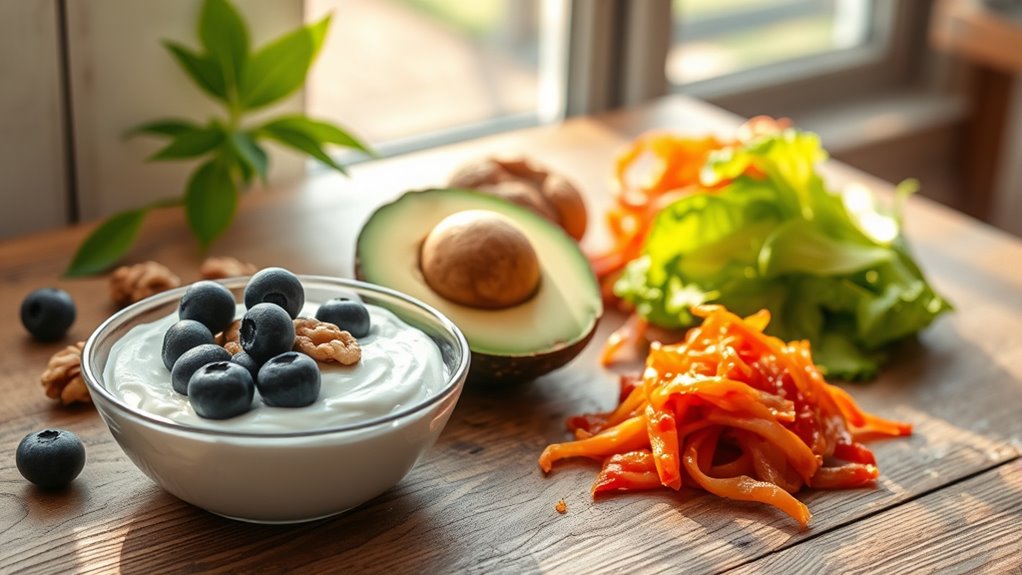To boost your mood naturally through your gut-brain connection, focus on eating a diverse range of nutrient-rich, fiber-packed foods like fruits, vegetables, whole grains, and healthy fats such as omega-3s from fish and nuts. Incorporate fermented foods like yogurt, kimchi, and sauerkraut to support good gut bacteria. Avoid processed foods high in sugar and simple carbs which can negatively impact your mood. Keep exploring these tips for a happier, healthier mind and gut harmony.
Key Takeaways
- Fermented foods like yogurt, kimchi, and sauerkraut introduce beneficial probiotics that enhance gut microbiome diversity and support mood regulation.
- Consuming fiber-rich foods such as oats, beans, and vegetables promotes gut health by fostering beneficial bacteria and producing mood-boosting SCFAs.
- Incorporating omega-3 fatty acids from fatty fish, flaxseeds, and walnuts reduces neuroinflammation and supports neurotransmitter function linked to mood.
- Limiting processed foods and simple sugars stabilizes blood sugar levels, preventing mood swings and promoting mental clarity.
- Eating a balanced diet with whole grains, healthy fats, and nutrient-dense produce nourishes the gut-brain axis for improved emotional well-being.
How Diet Shapes Your Gut Microbiome and Mood
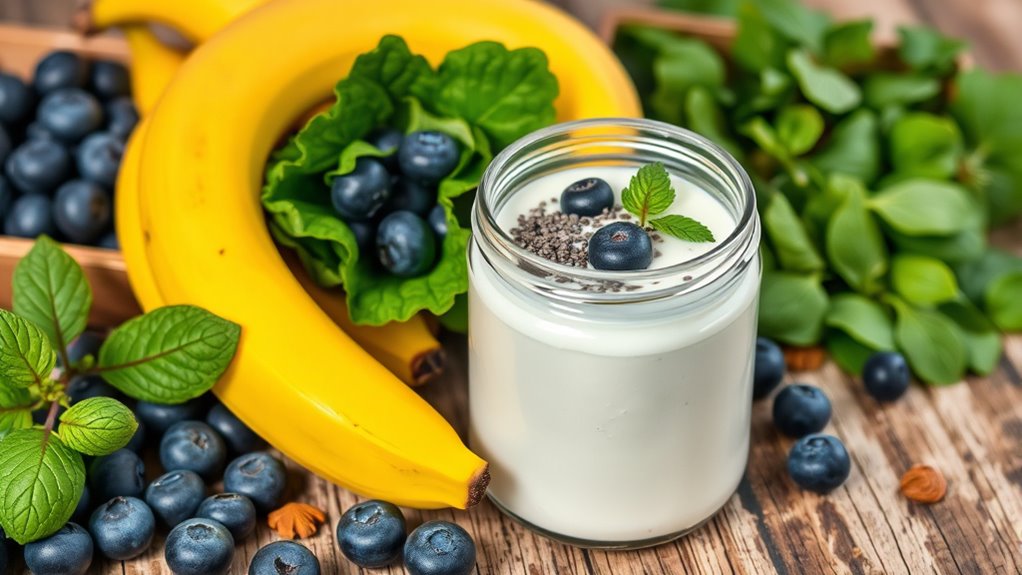
Your diet plays an essential role in shaping your gut microbiome, which directly influences your mood and mental health. The foods you eat can quickly alter the diversity and balance of your gut bacteria. High-fiber, nutrient-rich diets support a diverse microbiome, linked to better mental well-being, while Western diets tend to reduce diversity and may harm your mood. Consuming processed foods disrupts this balance, potentially increasing stress and anxiety. Fermented foods and fruits and vegetables promote gut health by boosting microbial diversity. These changes impact the chemicals produced by gut microbes, including serotonin—the mood-regulating neurotransmitter mainly produced in your gut. The gut-brain axis enables communication through nerve pathways, hormones, and immune signals, making your dietary choices essential for maintaining optimal mental health. Regularly incorporating mindful eating habits can further enhance gut health and support emotional well-being by fostering a healthy microbiome that promotes balance and resilience. Additionally, specific nutrients such as omega-3 fatty acids and probiotics can directly support a robust gut flora, further benefiting your mood and cognitive functions. Moreover, maintaining a diet rich in prebiotics can help nourish beneficial bacteria, promoting a more diverse and resilient microbiome. Maintaining a balanced diet can also help prevent inflammation, which is linked to mood disorders, by supporting gut microbiome diversity.
The Power of Healthy Fats and Proteins for Mental Well-Being
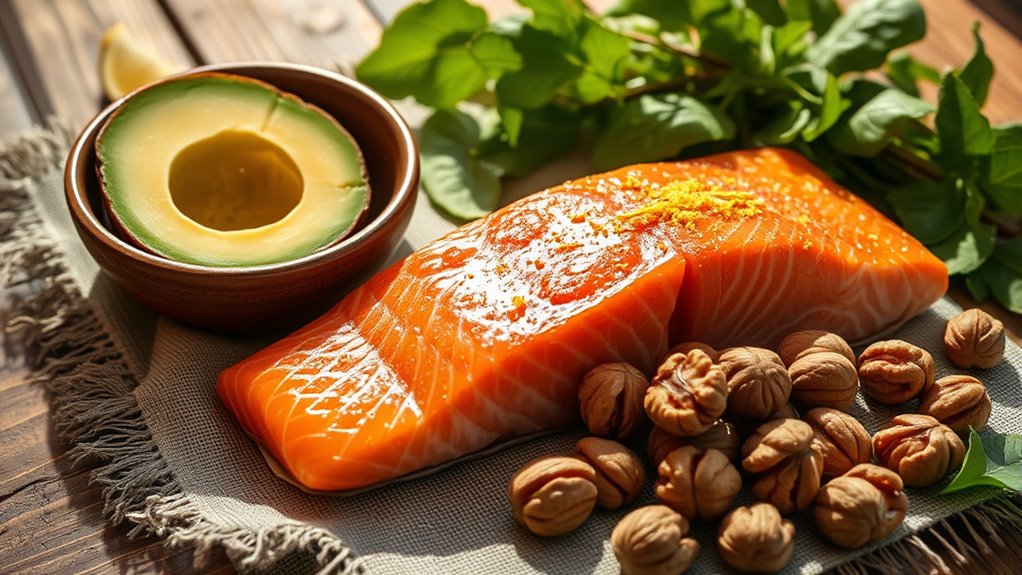
Healthy fats and proteins play a vital role in supporting your mental well-being. They influence mood regulation by reducing inflammation and providing the building blocks for neurotransmitter production. Incorporating the right sources into your diet can make a meaningful difference in how you feel.
Fats and Mood Regulation
Fats play a crucial role in regulating mood by supporting brain structure and chemical signaling. Omega-3 fatty acids, essential for maintaining neuron integrity, enhance neurotransmitter communication and reduce neuroinflammation, lowering depression risk. Consuming fatty fish, flaxseeds, or walnuts supplies these beneficial fats, improving serotonin transmission and supporting mental well-being. In contrast, high intake of saturated fats from processed foods, red meat, and dairy can promote neuroinflammation, disrupt gut health, and increase depression risk. Replacing saturated fats with healthier monounsaturated fats from sources like olive oil, avocados, and nuts boosts mood stability, reduces inflammation, and supports cardiovascular health. Additionally, dietary fats influence your gut microbiome, affecting neurotransmitter production and overall mental health, highlighting the importance of choosing quality fats for mood regulation. Incorporating healthy fats into your diet supports both your brain and gut health, promoting overall emotional resilience. Proper dietary choices can significantly impact your mental well-being by supporting the gut–brain connection, which is increasingly recognized as a key factor in mental health, emphasizing the impact of diet on emotional well-being. Including a variety of nutrient-rich foods ensures your body and brain receive the necessary building blocks for optimal mood regulation.
Proteins and Neurotransmitters
Proteins are fundamental to maintaining mental well-being because they provide the building blocks for neurotransmitters that regulate mood and cognition. Essential amino acids like tryptophan and tyrosine serve as precursors for serotonin, dopamine, and norepinephrine, influencing your mood, motivation, and stress response. Consuming tryptophan-rich foods like turkey and eggs supports serotonin production, while foods with tyrosine, such as chicken and almonds, boost dopamine. Proper protein intake also stabilizes blood sugar, preventing irritability and fatigue. To deepen your understanding:
| Nutrient | Impact on Mood & Brain Function |
|---|---|
| Tryptophan | Serotonin synthesis, mood stabilization |
| Tyrosine | Dopamine production, motivation |
| Glutamine | GABA support, anxiety reduction |
| Complete Proteins | All essential amino acids for neurotransmitters |
Beneficial Carbohydrates: Choosing Foods That Support Stability
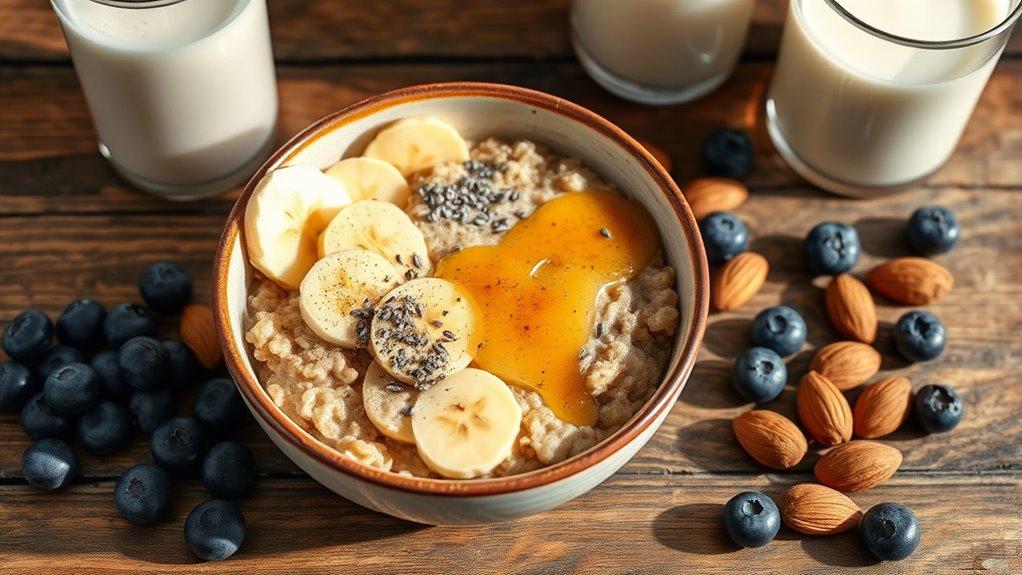
To support your gut and mood, focus on choosing complex carbohydrates over simple sugars. Limiting refined carbs and emphasizing whole grains helps keep your blood sugar steady and promotes a healthy gut. Balancing your carbohydrate intake is key to maintaining emotional stability and overall well-being. Incorporating whole grains into your diet can also provide sustained energy and improve your gut health. Additionally, engaging in activities like sound healing can further enhance your mental clarity and relaxation. Selecting foods with nutrient-dense ingredients supports overall health and helps sustain mood stability. For optimal results, consider integrating Vetted electric bike conversion kits, which promote eco-friendly travel and physical activity, both of which can positively influence mental health. Furthermore, choosing a hybrid bicycle for commuting can encourage regular exercise while reducing environmental impact.
Limit Simple Carbohydrates
Have you ever noticed how eating sugary snacks can leave you feeling anxious or irritable? That’s because simple carbohydrates cause quick blood sugar spikes followed by crashes, which impair your mood and cognitive function. Excessive intake links to feelings of nervousness, hopelessness, and restlessness. These rapid fluctuations also worsen mood swings and hinder emotional control. Foods high in glycemic index destabilize brain fuel, making your mood more erratic. To support mood stability, cut back on sugary treats, white bread, and processed snacks. Instead, opt for nutrient-dense options like vegetables, legumes, and whole fruits without added sugars. Limiting simple carbs helps prevent blood sugar dips, reduces insulin surges, and promotes steady neurotransmitter levels—essential for maintaining a balanced, calm mood. Monitoring macronutrient ratios and choosing foods that promote ketosis can also contribute to mood stability by providing consistent energy sources for your brain.
Emphasize Whole Grains
Choosing whole grains over refined options can considerably support your mood stability by promoting steady blood sugar levels. The fiber in whole grains slows glucose absorption, preventing energy crashes that trigger mood swings. Plus, they’re rich in B vitamins like thiamine, folate, and B6, which help produce neurotransmitters for emotional regulation. Magnesium in whole grains also reduces anxiety by modulating stress responses. Additionally, fiber nourishes your gut microbiota, influencing serotonin production through the gut-brain axis. Gut health plays a crucial role in emotional well-being, and whole grains support this connection. Whole grains can also contribute to a vibrant beach-town lifestyle by supporting overall well-being and energy levels. To maximize benefits, consider:
- Incorporating oats, brown rice, or whole wheat into your meals
- Choosing minimally processed grains for best nutrient preservation
- Combining whole grains with protein and healthy fats for sustained energy
Prioritizing whole grains supports long-term mood stability by fostering balanced blood sugar and gut health.
Balance Blood Sugar
Incorporating the right types of carbohydrates can substantially improve blood sugar stability and support mood regulation. Focus on complex carbs like legumes and starchy vegetables, which release energy slowly and prevent spikes. Fiber plays a key role by slowing sugar absorption, helping you feel full longer and reducing cholesterol. Foods with a low glycemic index, such as sweet potatoes and lentils, promote steady blood sugar levels. Pair carbs with protein and healthy fats to further stabilize glucose and enhance mood. Avoid simple sugars found in sweets and sugary drinks, as they cause rapid rises and drops in blood sugar, negatively impacting mood and energy. Checking food labels for added sugars helps you make smarter choices. Incorporating fiber and healthy fats such as chia seeds can further support blood sugar stability and mood. Additionally, choosing beneficial carbohydrates like oats and quinoa can provide sustained energy and mood benefits. Being mindful of glycemic index values can help you select foods that best support mood and stability.
Incorporating Fermented Foods and Probiotics for Gut Happiness
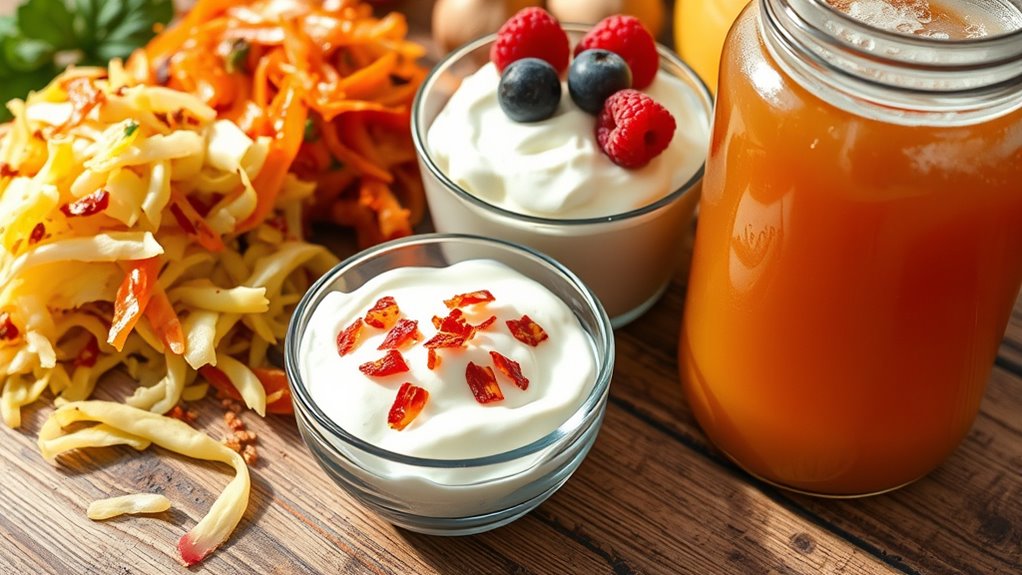
Adding fermented foods and probiotics to your diet can considerably boost your gut health and support your mental well-being. These foods influence the microbiota-gut-brain axis by strengthening intestinal and blood-brain barrier integrity and modulating immune responses. Including options like kimchi, yogurt, and sauerkraut can enhance gut flora diversity and promote brain health. Probiotics found in these foods, such as *Lactobacillus bulgaricus*, help establish beneficial bacteria in your gut, regulate immune function, and influence mood through neural pathways. They also affect gut hormones like serotonin, impacting emotion and behavior. To maximize benefits, choose fermented options rich in live probiotics and incorporate them regularly, supporting both your digestive system and mental resilience. Research supports incorporating these foods into your diet as a simple way to maintain overall health. Consuming a variety of fermented foods can further enhance gut microbiota diversity and overall efficacy. For example, proper storage of fermented foods ensures the preservation of live probiotics, making them more effective. Practicing proper gear shifting techniques can also contribute to a smoother ride, reducing stress on your body during physical activity.
The Role of Fiber in Enhancing Gut Diversity and Mood
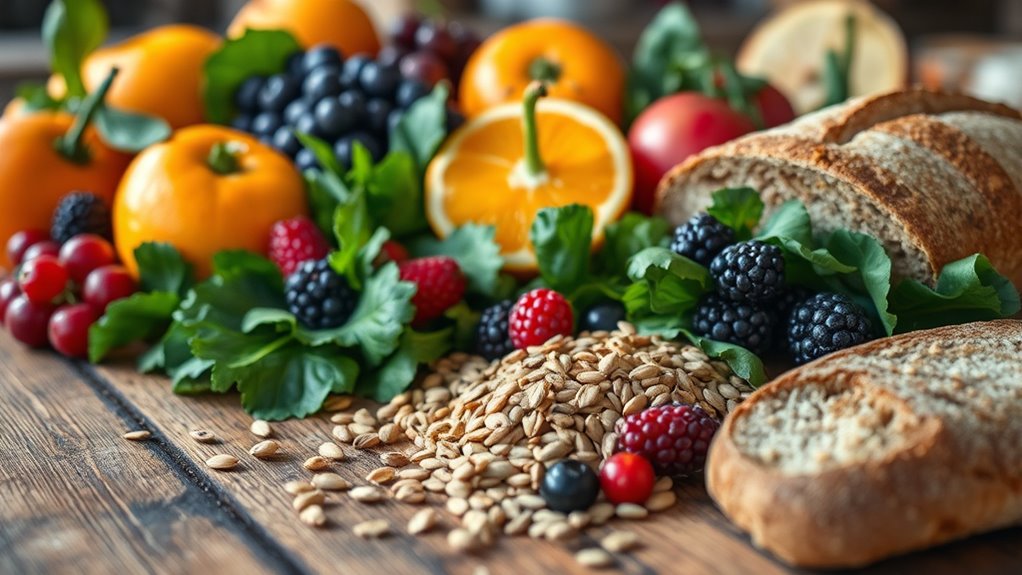
Building on the influence of fermented foods and probiotics on your gut-brain connection, fiber plays a vital role in shaping your gut microbiome’s diversity. When you eat more fiber-rich foods like asparagus, garlic, oats, beans, or whole wheat, you promote a wider variety of beneficial bacteria. This diversity is linked to better mental health, including lower anxiety and depression. Fiber also boosts production of short-chain fatty acids (SCFAs), which support brain function and reduce inflammation. Prebiotic fibers, such as inulin and FOS, encourage growth of mood-enhancing bacteria like Bifidobacterium. By including a mix of soluble fibers and resistant starches, you help maintain a resilient microbiome, supporting both your gut health and emotional well-being.
Dietary Patterns That Promote Brain Health and Emotional Balance
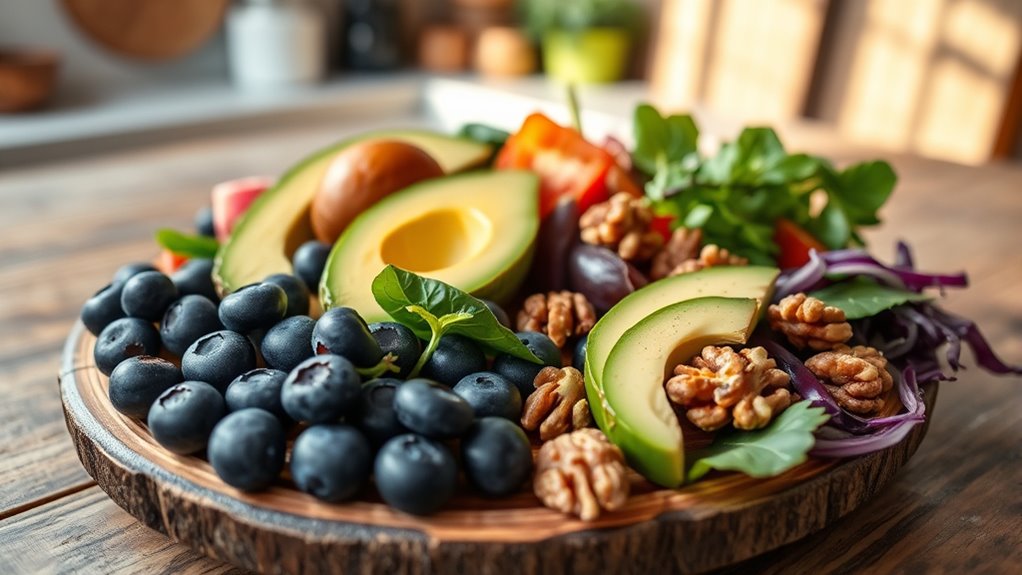
Adopting a balanced dietary pattern is essential for supporting your brain health and emotional well-being. A diet rich in fruits, vegetables, whole grains, lean proteins, and healthy fats directly benefits cognitive function and mood stability. It also influences the gut microbiome, which plays a key role in nutrient absorption and neurotransmitter production, like serotonin, crucial for mood regulation. Prioritizing balanced eating habits can lead to better mental health outcomes compared to restrictive or processed diets. To optimize your diet, consider these factors:
- Emphasize nutrient-dense, anti-inflammatory foods to reduce brain inflammation.
- Incorporate diverse, fiber-rich foods to promote a healthy gut microbiome.
- Limit processed foods and high-sugar items to decrease risks of depression and cognitive decline.
A consistent, balanced diet supports your brain and emotional resilience over time.
Practical Tips for a Mood-Boosting, Gut-Friendly Diet
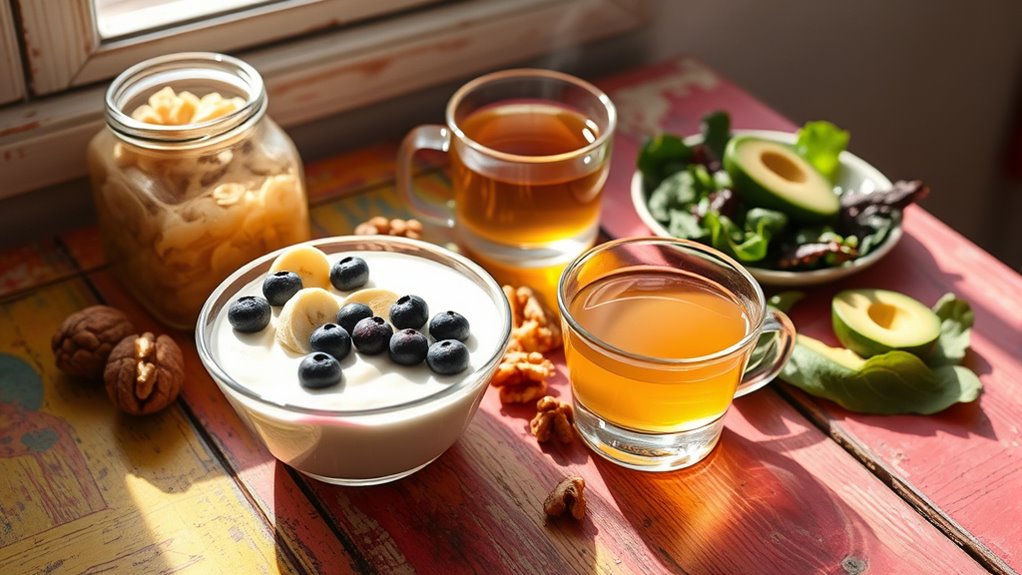
A balanced diet not only supports your brain health but also plays a vital role in maintaining a happy, stable mood through your gut. Prioritize drinking plenty of water to help your gut absorb nutrients and boost bacterial diversity. Eat slowly to improve digestion and reduce bloating. Incorporate foods rich in polyphenols, like fruits, vegetables, and dark chocolate, to support your microbiome. Include probiotic foods such as yogurt, kefir, kimchi, and sauerkraut to introduce beneficial bacteria. High-fiber foods promote healthy bacteria growth, while omega-3-rich fish can reduce inflammation. Avoid processed and sugary foods that harm your gut. Practice mindful eating, stay hydrated, and choose whole, nutrient-dense foods to nurture your gut and elevate your mood naturally.
Frequently Asked Questions
Can Specific Foods Directly Cure Mood Disorders?
You might wonder if specific foods can directly cure mood disorders. While certain nutrients like omega-3s, antioxidants, and complex carbs can help stabilize your mood and support brain health, they aren’t standalone cures. You should see them as supplementary to traditional treatments like therapy and medication. Incorporating these foods into your diet can improve your overall well-being, but managing mood disorders requires a holistic approach.
How Quickly Can Diet Changes Improve Mental Health?
Ever wonder how fast your mood can improve with diet changes? You might notice benefits in just a few weeks, especially if you introduce omega-3-rich fish or reduce processed foods. Keep in mind, individual responses vary, and it often takes several weeks to months for significant changes. Tracking your symptoms and consulting a healthcare professional can help you stay on track and see the best results.
Are Supplements Necessary for Gut-Brain Health?
You might wonder if supplements are necessary for gut-brain health. While a balanced diet rich in probiotics and nutrients supports your gut and mood, supplements offer concentrated, targeted doses that can fill dietary gaps. They’re especially helpful if you struggle to consume enough probiotic foods daily or have specific gut issues. However, combining supplements with healthy lifestyle choices and medical advice maximizes benefits for your mental and digestive well-being.
Do Individual Genetics Influence Diet’s Impact on Mood?
Yes, your genetics influence how diet affects your mood. You have unique gene variants that shape your taste preferences, response to nutrients, and how your body processes food. Certain genes can make you more susceptible to mood disorders or improve your resilience. By understanding your genetic makeup, you can tailor your diet to boost your mental health, choosing foods that support your brain function and emotional well-being.
Is There a Recommended Daily Intake for Mood-Enhancing Nutrients?
You might wonder if there’s a set daily amount for mood-boosting nutrients. The answer is yes. Experts recommend about 25-30 grams of fiber, 600-800 IU of vitamin D, 400 mg of magnesium, 8-18 mg of iron (depending on gender), and 1.3-1.5 mg of vitamin B6 daily. Sticking to these guidelines helps support your mental health, mood, and overall well-being.
Conclusion
By choosing nourishing foods, supporting your gut health, and embracing balanced eating habits, you can boost your mood naturally. Prioritize healthy fats, lean proteins, and fiber-rich carbs. Incorporate fermented foods and stay mindful of your dietary patterns. nurture your gut, nurture your mind, and nurture your overall well-being. Because when your gut thrives, your mood lifts, your mind sharpens, and your life becomes brighter. Make these choices today for a happier, healthier tomorrow.
